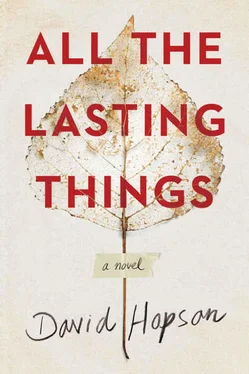She squints her eyes and sweeps the crowd like a lamp from a lighthouse. That’s it! Not the sea, but a lighthouse. She chastises herself: It’s called Lighthouse , stupid. And there it is: the dress. She raises her phone, turning on the app that sends color-coded pulses of light, a Morse code of their own making for exactly this purpose, finding one another in a crowd. The music begins just as the two of them settle in. There is no time for talk. No time to ask about the other’s day. The crowd quiets. They kiss quickly as her wife smooths the dotted dress and she herself peels the foil top from the wine, as if nothing were amiss, as if the night wasn’t nearly ruined.
Eight weeks. Four weeks. Twenty-some years. If she thinks about it, it’s all so sad. So terribly heavy, if you let it be. It can leave you stripped and naked and utterly alone. The thoughts dance in her mind, tiny threads hanging from a sweater that she has to choose, deliberately choose, not to pull. Satisfying as unraveling can be. Sad as the world sometimes is, she also knows its beauty, its rare and occasionally breathtaking charms. There are days it leaves her helpless, paralyzed with happiness, afraid to move lest she set the clock ticking again and bring it all closer to its end.
She touches her belly. They clink plastic glasses. Five months. Five months. The cello rises in a wave that crashes into silence. Then the violins. Then a boy, barely visible to her, so tiny at this distance under his yellow veil of light, sings in a clear, liquid soprano, “Tomorrow.”
They own everything he ever recorded, but this is the only thing he lived to write. Who knows what he might have done?
“If it’s fine — tomorrow.”
He certainly would have finished his opera, she thinks. He was so close. She feels sure of this. But. But. She wants to say something to him, to speak privately, as if in prayer, to thank him for this moment, this night. She puts one hand on her wife’s leg, on the soft silk of the spotted dress. She eats another grape. Everything seems possible. Everything seems right. She closes her eyes and tries. She tries, but it feels so silly. The words won’t come. But if she does this, she feels the need to do it right. To call his attention, if his attention is there (somewhere out there) for the calling. (There are days she doesn’t know what to believe.) But how to begin? Her memory! she laments. How to begin, how to do it right, how to thank him for one incandescent moment, when she cannot, for the life of her, remember his name?
The following people have my deepest gratitude:
My editor, Carmen Johnson, and my agent, Kate Garrick, both of whom so generously helped me discover a new and better book in the one I’d written;
My friends and family, some of whom read earlier drafts and provided me with encouragement and tremendously insightful critiques, all of whom have offered their love, support, humor, free psychological consults, career counseling, and never-ending wisdom: Adesh Brasse, Liz Budnitz, David Cafiero, Ken Corbett, Christina Crosby, Michael Cunningham, Matt Feldman, Meg Giles, Michelle Hand, Lyle Ashton Harris, Beverly Hopson, Kevin Hopson, Tara Hopson, Janet Jakobsen, Daniel Kaiser, James Lecesne, Leyden Lewis, Debie Lowe, Christian McCulloch, Adam Moss, Christopher Potter, Dave Purcell, Seth Pybas, Sal Randolph, and photographer extraordinaire Matthew Sandager;
Ian Holloway, for whom I don’t have enough endearments;
Tyler and Grace Hopson, Bird and Mila Giles-Purcell, and Sophía Holloway Osorno, who are too young to read this book at the moment but belong in this list;
Matthew Rottnek and Joan Swanson, for patching a sometimes leaky ship and keeping it afloat;
And Melvin Galloway. For everything.

Photo © 2015 Matthew Sandager
David Hopson earned an MA in American and English literature from Washington University in St. Louis and an MFA in fiction from Columbia University. He lives in Brooklyn. All the Lasting Things is his first novel.













